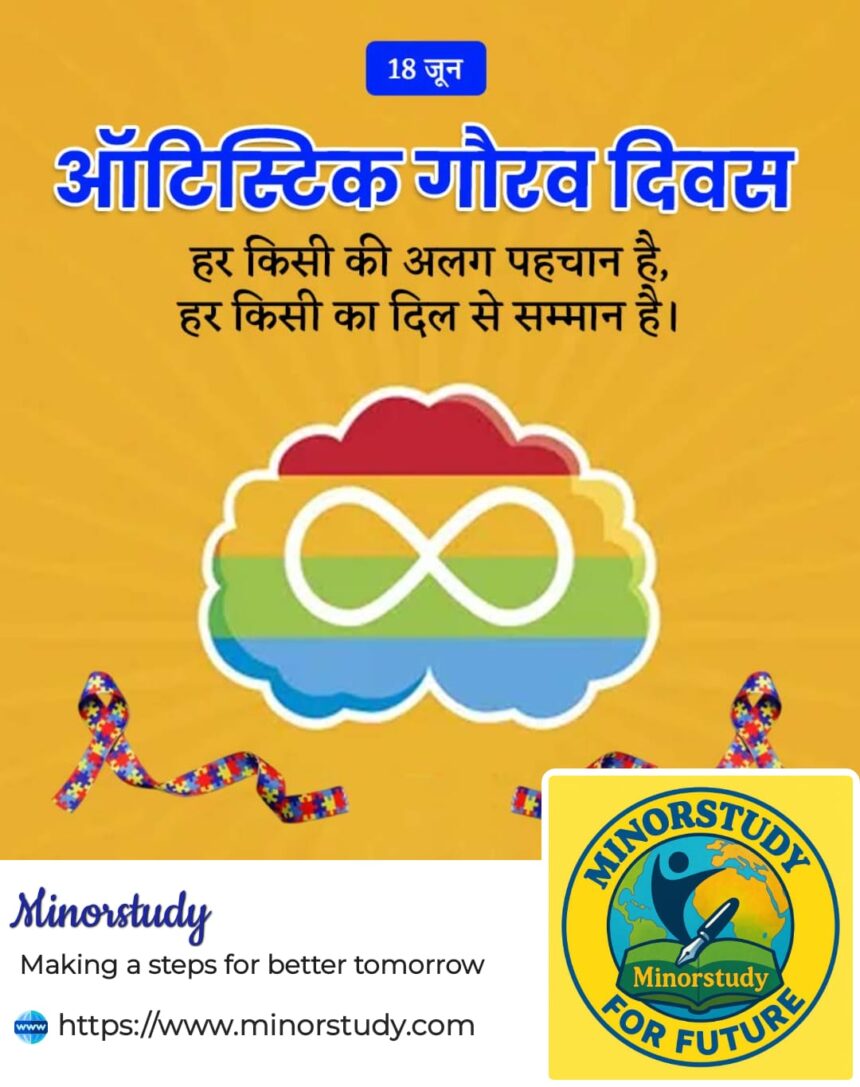🌈 5 Powerful Reasons to Embrace Autistic Pride Day – A Joyful Celebration of Neurodiversity
Autistic Pride Day: Every year on June 18, Autistic Pride Day offers a vital reminder: autism is a form of valued human variation, not a defect to be cured. Born from the self‑advocacy movement, it celebrates autistic identity, promotes acceptance over pity, and empowers autistic voices. Let’s dive into everything you need to know—from history and facts to how you can join in.
- 🧬 History of Autistic Pride Day
- ⏳ Timeline: Key Milestones
- 📚 5 Facts You Should Know
- 🧭 Significance: Why It Matters
- 1. Celebrates Identity
- 2. Promotes Self‑Advocacy
- 3. Fights Stigma
- 4. Strengthens Community
- 5. Advances Equity
- 💖 Ways to Observe Autistic Pride Day
- ❓ FAQs
- 🎉 Wishing You a Happy Autistic Pride Day
- 🌍 Impact on Daily Life & Society
- ✅ Key Takeaways
- 🔚 Conclusion: Pride, Not Pity
🧬 History of Autistic Pride Day
Autistic Pride Day began in 2005, rooted in the mission of Aspies for Freedom (AFF)—an autistic-led online collective autisticempire.com+5autisticprideday.org+5ameridisability.com+5the-art-of-autism.com+6awarenessdays.com+6daysoftheyear.com+6pacehospital.com+10en.wikipedia.org+10autisticempire.com+10. They chose June 18 because it was the birthday of the youngest member at the time daysoftheyear.com+4en.wikipedia.org+4hindustantimes.com+4. Inspired by the gay pride movement, AFF sought to shift perspectives from pity and cure to pride, visibility, and self-affirmation hindustantimes.com+4en.wikipedia.org+4autisticempire.com+4.
What began as a grassroots online event rapidly blossomed. Today, it’s marked globally with picnics, talks, art shows, workshops, and online gatherings—from London’s Hyde Park to Melbourne and Paris . Even during COVID‑19, organizers hosted virtual marathons and online celebrations .
⏳ Timeline: Key Milestones
| Year | Milestone |
|---|---|
| 2005 | First Autistic Pride Day by AFF on June 18 en.wikipedia.org+13en.wikipedia.org+13hindustantimes.com+13 |
| 2006 | AFF begins annual advocacy |
| 2018 | Autistic Pride Reading incorporated as a charity |
| 2020 | First Autistic Pride Online Celebration (11 hours) |
| 2023 | Autistic-led event in Sydney with official logo launch |
📚 5 Facts You Should Know
Founded by autistic people—not charities—led by Aspies for Freedom nationaldayarchives.com+11en.wikipedia.org+11myautism.org+11.
Symbol: The rainbow infinity icon marks infinite neurodiversity, rejecting “cure” narratives hindustantimes.com+6autisticprideday.org+6autisticempire.com+6.
Global reach: Celebrated in cities like London, Paris, Melbourne, Toronto, and online everywhere .
COVID adaptation: Transitioned to virtual platforms with global teams sharing experiences and art en.wikipedia.org+2en.wikipedia.org+2the-art-of-autism.com+2.
Theme evolution: Themes like “Taking the Mask Off” and “Unapologetically Autistic” highlight empowerment autisticprideday.org+2hindustantimes.com+2pacehospital.com+2.
🧭 Significance: Why It Matters
1. Celebrates Identity
It flips the script—seeing autism not as illness but neurodiversity. The day affirms autistic identity and community.
2. Promotes Self‑Advocacy
Events are autistic‑led. Individuals set the narrative, not external charities nationaldayarchives.com+9autisticempire.com+9autisticprideday.org+9.
3. Fights Stigma
By declaring “pride not pity,” it challenges common misconceptions and promotes respect and inclusion daysoftheyear.com+2autisticprideday.org+2awarenessdays.com+2.
4. Strengthens Community
Through gatherings and storytelling, autistic people experience connection, belonging, and collective empowerment.
5. Advances Equity
Calls for accommodations, acceptance, and equal access in education, employment, healthcare, and society.
💖 Ways to Observe Autistic Pride Day
Join local events (picnics, meet‑ups, workshops) hosted by autistic-led groups.
Display the rainbow infinity symbol on clothes or social platforms awarenessdays.com+7autisticprideday.org+7snohomishcountywa.gov+7.
Share autistic voices—blogs, videos, testimonies—to amplify perspectives.
Learn and advocate—read about neurodiversity and support inclusive policies.
Support autistic creators—buy art, attend performances, champion work by autistic artists, writers, researchers.
❓ FAQs
Q1: Is it a public holiday?
No—it’s an awareness and celebration day on June 18 with community-led events worldwide awarenessdays.com+1ameridisability.com+1.
Q2: Why June 18?
It honors the birthday of AFF’s youngest member at the time of its founding in 2005 libguides.tccd.edu+6en.wikipedia.org+6hindustantimes.com+6.
Q3: Who organizes it?
Autistic individuals and self-led groups (e.g., AFF, Autistic Pride Reading, Autistic Pride Alliance) en.wikipedia.org.
Q4: What’s the rainbow infinity symbol?
It stands for diversity, infinite possibilities, and rejects deficit-based, single-color narratives ameridisability.com+2autisticprideday.org+2autisticempire.com+2.
Q5: How is it different from Autism Awareness Month?
Autistic Pride focuses on acceptance and self-affirmation, not awareness or medical framing en.wikipedia.org+1autisticempire.com+1.
🎉 Wishing You a Happy Autistic Pride Day
Happy Autistic Pride Day! If you’re autistic, may you feel empowered, valued, and connected today. If you’re an ally—thank you. Stand alongside autistic voices, listen with intention, and help amplify a message of pride, respect, and inclusion.
🌍 Impact on Daily Life & Society
Culture: Inspires autistic-written art, memoirs, blogging, and filmmaking (like Temple Grandin, Mickey Rowe) en.wikipedia.org+1en.wikipedia.org+1.
Policy & Rights: Influences disability laws and autism-support policies through self-advocacy, e.g., Autistic Self Advocacy Network (ASAN) founded 2006 autisticprideday.org+3en.wikipedia.org+3en.wikipedia.org+3.
Education & Work: Promotes need for sensory-aware classrooms, flexible workplaces, and universal design.
Community: Helps autistic people reduce masking, find belonging, and support each other beyond stereotypes.
Allies & Acceptance: Promotes positive action over passive awareness.
✅ Key Takeaways
Autistic-led and proudly democratic, it’s not driven by charities.
The rainbow infinity symbol stands for diversity and rejection of “deficit” views.
Offers self-empowerment through community, art, and advocacy.
Helps build a more inclusive world that respects autistic identity, needs, and potential.
🔚 Conclusion: Pride, Not Pity
On June 18, we don’t just observe—we celebrate deeply: autism as identity, community, and contribution. Autistic Pride Day urges us to drop pity and stigma, embrace authentic expression, and champion neurodiversity as essential to collective growth.
Whether you’re autistic, allied, a policymaker, teacher, friend, or family—today calls us to listen better, support actively, and rejoice in difference. Let’s not wait for permission. Let’s proudly affirm:
“I am autistic, and I am proud.”








